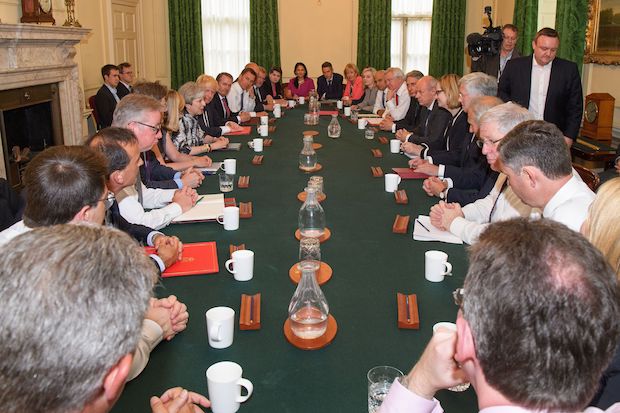One of the few bits of legislation that the government thinks it can get past MPs is a domestic violence bill, which was announced as a draft bill in the Queen’s Speech. Yesterday the minister responsible for taking the Bill through the Commons, Sarah Newton, held a meeting with MPs, campaigners and survivors of abuse to talk about what the government is planning to do.
Now, you’d think that the government might be pursuing this Bill because everyone is opposed to domestic violence and therefore no MP will vote against it. But as I’ve explained before, it’s a bit more complicated than that – both in terms of certain political beliefs about ‘meddling’ in families, civil liberties and new criminal offences as well as the fact that it’s all very well spending months talking about your fancy bill, but you’re not going to make much difference to those women trying to flee abusive partners if you don’t allocate enough funding to help those victims, or indeed ensure that the police understand what domestic abuse is (clue: it’s not just about cavemen hitting women in council houses).
Those working in the sector were therefore very keen to press Newton on the legal definition of domestic abuse which the Bill will set out for the first time, as this could include a proper recognition that abuse is about control and can often be entirely non-violent, or a recognition of specific types of abuse within certain groups in society, such as Female Genital Mutilation. They’re also anxious about the much-vaunted Domestic Abuse Commissioner that the Bill, which Newton said was expected in the Spring, will create. Will this Commissioner have strong enough powers to tackle poor police responses to abuse, for instance?
It wasn’t just campaigners who asked questions: I was lurking at the meeting too as a member of the press, and told Newton that I would have to end up making her life rather difficult if the Bill wasn’t accompanied by more money for the sector, given how many refuges are closing (around 17 per cent since 2010) and how many other specialist services, such as support workers for women leaving abuse, have had their funding severely cut by cash-strapped local government. Newton’s response was rather telling. She complained that I was being far too negative too quickly, when everyone in the room wanted to be positive and work together. Wouldn’t it be great, she asked, if I could help create a positive story about this bill?
Being positive and cheerful isn’t a great attribute for journalists, as it happens. It’s much better for us to be grumpy and cynical, as it means we won’t let ministers off the hook for creating a bad bill, no matter how positive they are about what they’re doing. Looking on the bright side of everything might have worked for Pollyanna, but she probably wouldn’t have made a particularly effective reporter.
Ministers often get this way when they are overseeing a reform that is, in principle, a Good Thing. It is a Good Thing that the government wants to take domestic violence more seriously in legislation, just as it was a Good Thing that it wanted to overhaul the benefits system to make work pay and simplify things for claimants. This does not automatically mean, however, that the way the government then goes about doing these things is necessarily good. In fact, in terms of the quality of the legislation and the design of policies, Good Things can end up morphing into Bad, Damaging, Ugly Things that don’t improve the lives of those the well-intentioned minister and their civil servants are trying to help.
By the time he launched his Universal Credit reforms in the House of Commons, Iain Duncan Smith was so convinced that he was doing a Good Thing that he would lose his temper very quickly with anyone who had the temerity to point out that there were some complex problems with the reform which might affect its implementation. Given how complex UC is, this made for many years of grouchy exchanges in the Chamber and in select committee hearings. Duncan Smith was defending the principle of the reform to people who actually agreed with him but were trying to engage with him on the detail.
Even a Motherhood and Apple Pie Bill could be badly designed, resulting in poisonous or at least really rather disgusting-tasting apple pies. Ministers can speak in poetry about the importance of what they’re doing, but if they dismiss the concerns of those who respond in prose, then they’re missing out on ensuring that a Good Thing can really work.
It’s not just journalists who need to be grumpy: so does Parliament. A good House of Commons is one in which MPs on all sides are questioning whether Good Things before them will actually end up doing good effectively. Currently, the government is trying to avoid this happening on every matter, whether incontrovertibly good like tackling domestic abuse, or controversial and complex, like Brexit. Select Committees cannot meet because the elections for their Conservative members are delayed until the autumn, and ministers are trying to prevent Opposition Day debates from taking place for as long as possible, too.
Anyone who really cares about the real effects that government policy and spending can have won’t want to worship at the altar of Good Things. To avoid those Good Things turning bad, they’ll be having a jolly good peek under the altar cloth instead. Perhaps at the end of it all, ministers can give themselves a pat on the back for doing a Good Thing. But not before they’ve even worked out what they’re doing, and certainly not before they’ve ensured that what they’re doing is actually going to help.







Comments